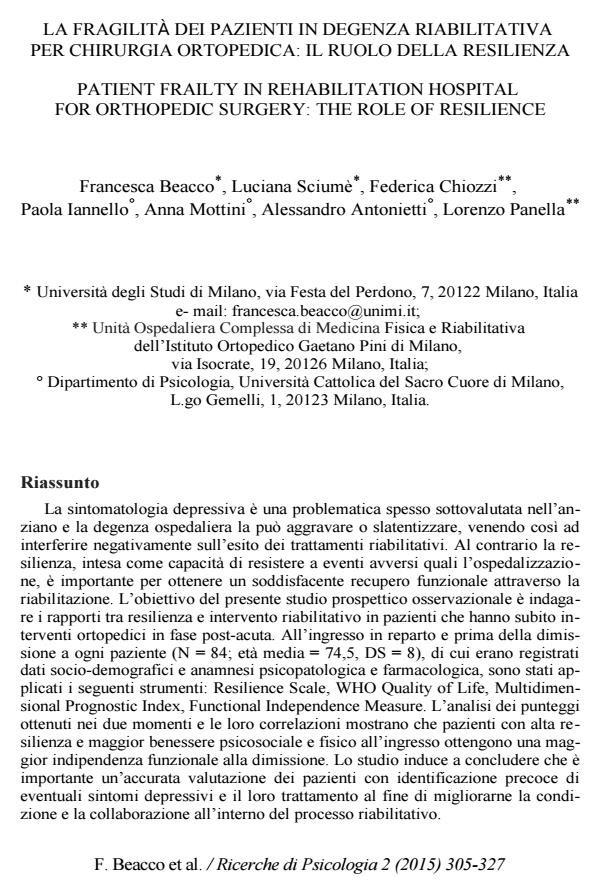Patient frailty in rehabilitation hospital for orthopedic surgery: the role of resilience
Journal title RICERCHE DI PSICOLOGIA
Author/s Francesca Beacco, Luciana Sciumè, Federica Chiozzi, Paola Iannello, Anna Mottini, Alessandro Antonietti, Lorenzo Panella
Publishing Year 2015 Issue 2015/2
Language Italian Pages 23 P. 305-327 File size 504 KB
DOI 10.3280/RIP2015-002002
DOI is like a bar code for intellectual property: to have more infomation
click here
Below, you can see the article first page
If you want to buy this article in PDF format, you can do it, following the instructions to buy download credits

FrancoAngeli is member of Publishers International Linking Association, Inc (PILA), a not-for-profit association which run the CrossRef service enabling links to and from online scholarly content.
Depressive symptomatology in late life is a serious problem too often overlooked and the hospital stay may even aggravate or unmask it, thus interfering negatively with the outcome of rehabilitation treatments. On the contrary, resilience, that is, the ability to copy with adverse events such as hospitalization, is important to obtain a satisfactory functional recovery through rehabilitation. The aim of this prospective observational study is to investigate the relationship between resilience and rehabilitative intervention in patients who have undergone orthopedic surgery in post-acute. In two different moments, at admission and discharge, patients (N = 84; mean age = 74,5, SD = 8) were administered the following instruments: Resilience Scale, WHO Quality of Life, Multidimensional Prognostic Index, Functional Independence Measure. Data analysis showed that patients with high levels of both resilience and physical/psychosocial well-being at admission reach a greater functional independence at discharge. Results highlight the importance of an early identification and treatment of depressive symptoms in elderly in order to improve the condition and the collaboration within the rehabilitation process.
Keywords: Depression, resilience, quality of life, orthopedics, rehabilitation.
- Le concezioni dell'apprendimento negli anziani ospedalizzati Rosa Cera, Alessandro Antonietti, in RICERCHE DI PSICOLOGIA 4/2019 pp.565
DOI: 10.3280/RIP2018-004002
Francesca Beacco, Luciana Sciumè, Federica Chiozzi, Paola Iannello, Anna Mottini, Alessandro Antonietti, Lorenzo Panella, La fragilità dei pazienti in degenza riabilitativa per chirurgia ortopedica: il ruolo della resilienza in "RICERCHE DI PSICOLOGIA " 2/2015, pp 305-327, DOI: 10.3280/RIP2015-002002